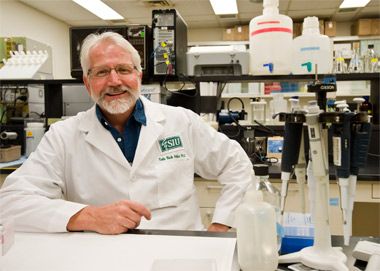
Dale “Buck” Hales
August 30, 2013
SIU scientists make lasting contributions
Like many of you, cancer has touched my family. It claimed my dad in 1980 at the age of 56, my mom 11 years later at age 66. Those experiences add to my deep appreciation of the researchers in our School of Medicine who are so passionate about preventing, treating and curing all forms of cancer.
Dale “Buck” Hales, a reproductive scientist, focuses on ovarian cancer. He is fond of saying that he and his colleagues “want to turn ovarian cancer into a disease women die with but don’t die from.”
A native of Denver, Buck is a professor and chair of the Department of Physiology, and he also is a professor in the Department of Obstetrics and Gynecology. He and wife Karen, also a faculty member in both departments, came here from Chicago in 2009.
“I went to my first Sunset Concert that June and I thought, ‘I love this place,’” Buck said. “This is such a college town; everybody’s a Saluki. I love the whole campus spirit.”
He also appreciated being asked to lead the department.
“Some of the reproductive biologists here are world-famous,” he said. “The Department of Physiology has a reputation.”
Buck’s dad was a pharmacist, and Buck was being groomed to take over the family drugstore. However, Buck was drawn more to science than business.
“I was hoping to make a difference. When I started working on ovarian cancer, I was struck by how important the work is perceived by so many people.”
His groundbreaking research has the potential to make a difference for many women; about 20,000 are diagnosed with ovarian cancer every year. There are few symptoms until the disease is in late stage.
“The best way to cure ovarian cancer is to prevent it,” he said.
Buck agrees with the American Institute for Cancer Research that nutrition-based therapy could treat or cure 60 percent of cancers. In a five-year study, Buck and his team fed laying hens -- the unique animal they use for their research -- a diet enriched with flaxseed and found that it reduced the prevalence and severity of ovarian cancer. Flaxseed is rich in omega-3 fatty acids, which provide numerous health benefits.
For women, that translates to eating 10 tablespoons of flaxseed a day.
“We suggest women get as much flaxseed as they can by incorporating it into smoothies, into baked goods, putting it on their cereal, and supplementing their intake with flax oil pills,” Buck said.
He advises that girls start taking flaxseed early in their teens and make it a dietary staple their entire lives.
“Education is an important component,” he said. “The western diet is really a culprit here.”
Buck is optimistic about the impact his research will have on women’s health. Ovarian cancer has the highest mortality rate of all reproductive cancers, and affects one in 75 women.
“If we are able to affect a certain percentage of the population by educating them and having them incorporate flax into their diet, the incidence of ovarian cancer is bound to go down,” he said.
Like his colleagues throughout the university, Buck is making a lasting contribution.
